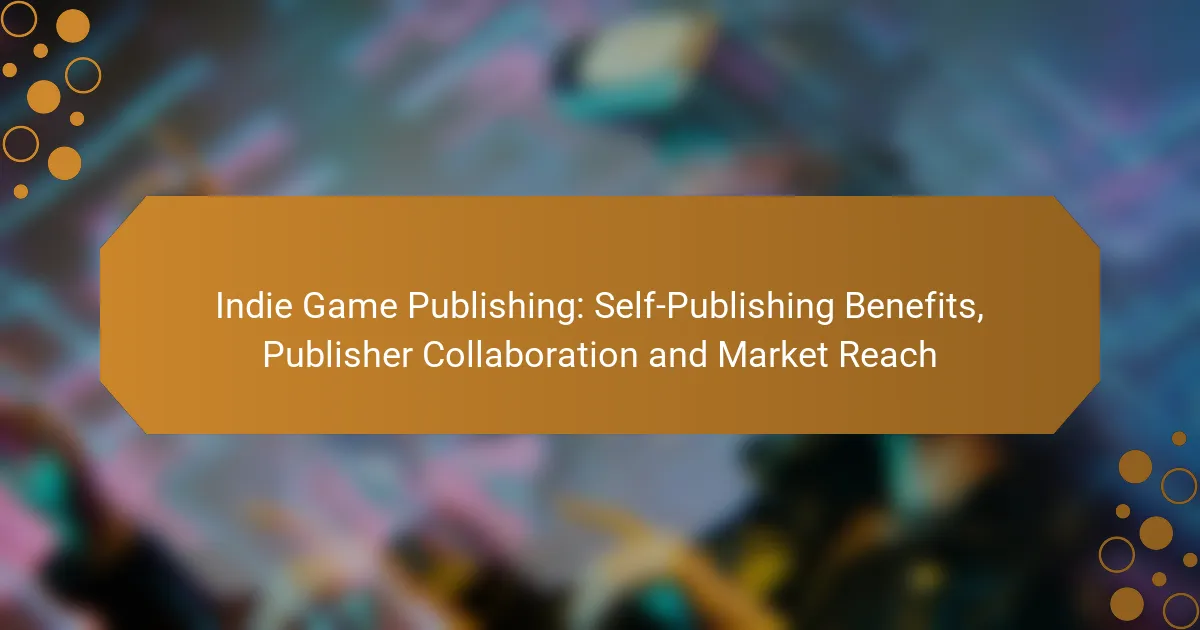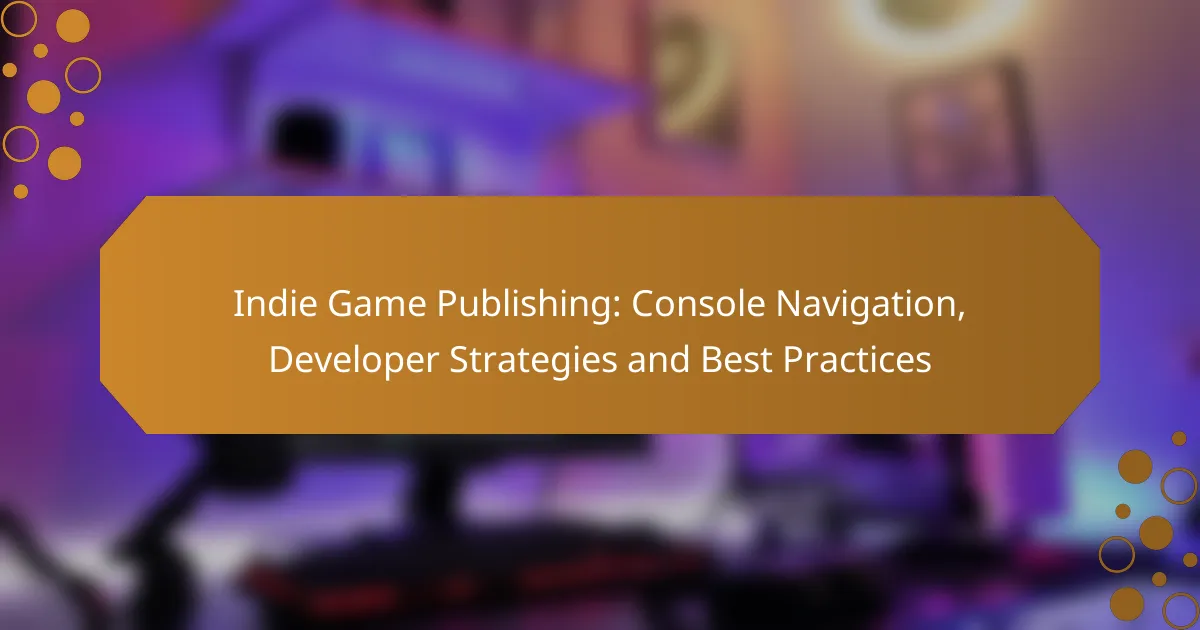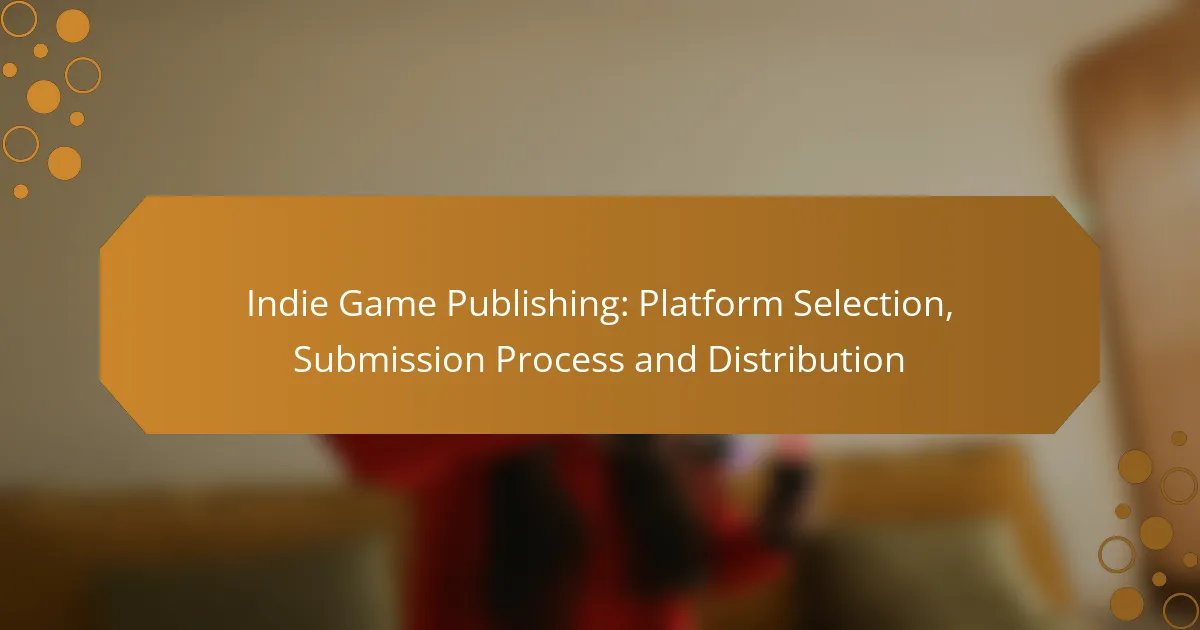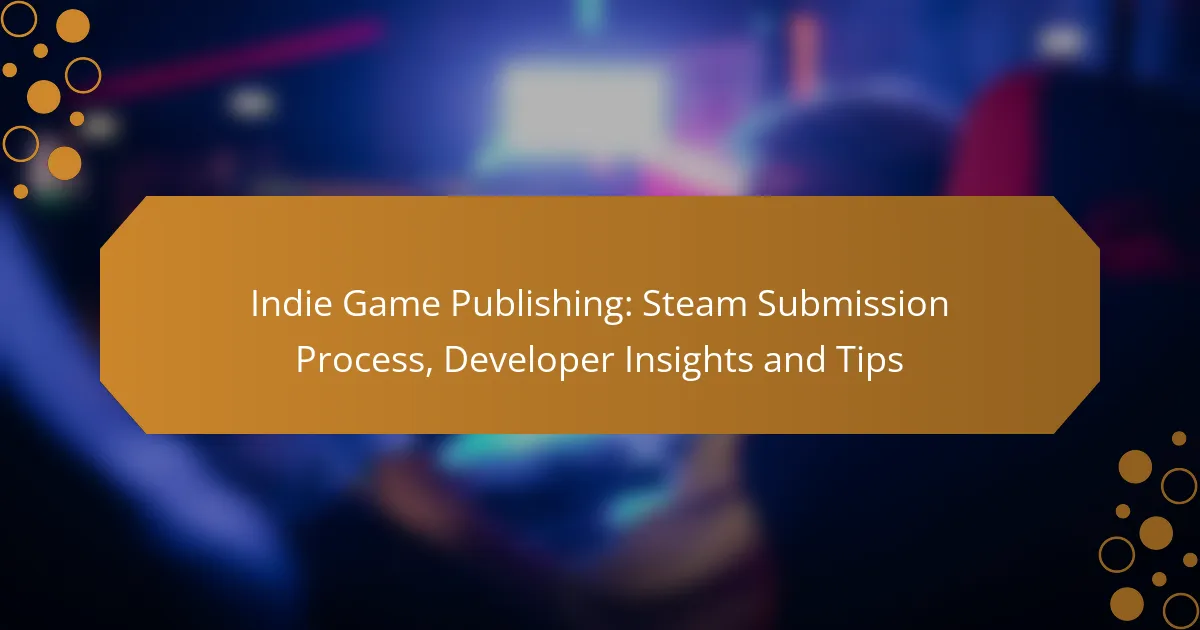Indie game publishing presents developers with the opportunity to self-publish, granting them creative control and a greater share of revenue while fostering direct engagement with their audience. Alternatively, collaborating with publishers can provide essential resources and expertise, enhancing the game’s potential for success. Understanding the target audience and utilizing effective marketing strategies are vital for maximizing market reach in this competitive industry.
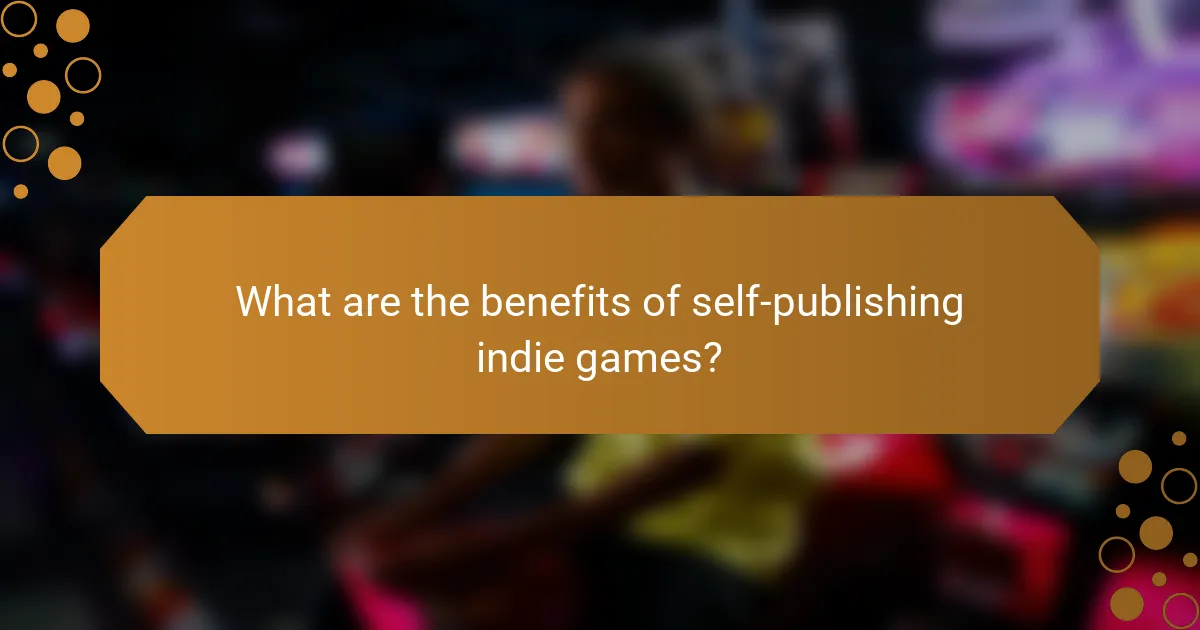
What are the benefits of self-publishing indie games?
Self-publishing indie games offers developers significant advantages, including complete creative control, a larger share of revenue, and the ability to engage directly with their audience. These benefits can lead to a more personalized gaming experience and potentially higher profits.
Full creative control
Self-publishing allows developers to maintain complete creative control over their projects. This means they can make decisions about game design, art style, and narrative direction without needing to compromise with a publisher’s vision.
For instance, an indie developer can choose to implement unique gameplay mechanics or explore unconventional themes that may not fit mainstream expectations. This freedom can lead to innovative games that stand out in a crowded market.
Higher revenue share
When self-publishing, indie developers typically retain a higher percentage of the revenue generated from game sales. Unlike traditional publishing agreements, where publishers often take a significant cut, self-publishing can allow developers to keep upwards of 70-90% of the sales revenue.
This increased revenue share can be crucial for indie developers, especially when considering the costs of development and marketing. It enables them to reinvest in future projects or support ongoing updates for their current games.
Direct audience engagement
Self-publishing facilitates direct engagement with the gaming community, allowing developers to build a loyal fan base. Developers can communicate with players through social media, forums, and live streams, fostering a sense of community around their games.
This direct interaction can lead to valuable feedback, helping developers to refine their games based on player input. Additionally, it creates opportunities for crowdfunding or pre-sales, which can provide financial support before the game is fully launched.
Flexible release schedules
Indie developers who self-publish have the flexibility to set their own release schedules. They can choose to launch their games when they feel they are ready, rather than adhering to a publisher’s timeline.
This flexibility allows for more thorough testing and adjustments based on player feedback, which can enhance the overall quality of the game at launch. Developers can also time their releases to coincide with gaming events or seasonal trends to maximize visibility.
Access to digital distribution platforms
Self-publishing provides indie developers with access to various digital distribution platforms such as Steam, itch.io, and the Epic Games Store. These platforms enable developers to reach a global audience without the need for physical distribution.
Utilizing these platforms often requires understanding their specific requirements and fee structures, but they offer significant exposure. Developers can also take advantage of promotional opportunities and sales events to boost visibility and sales.
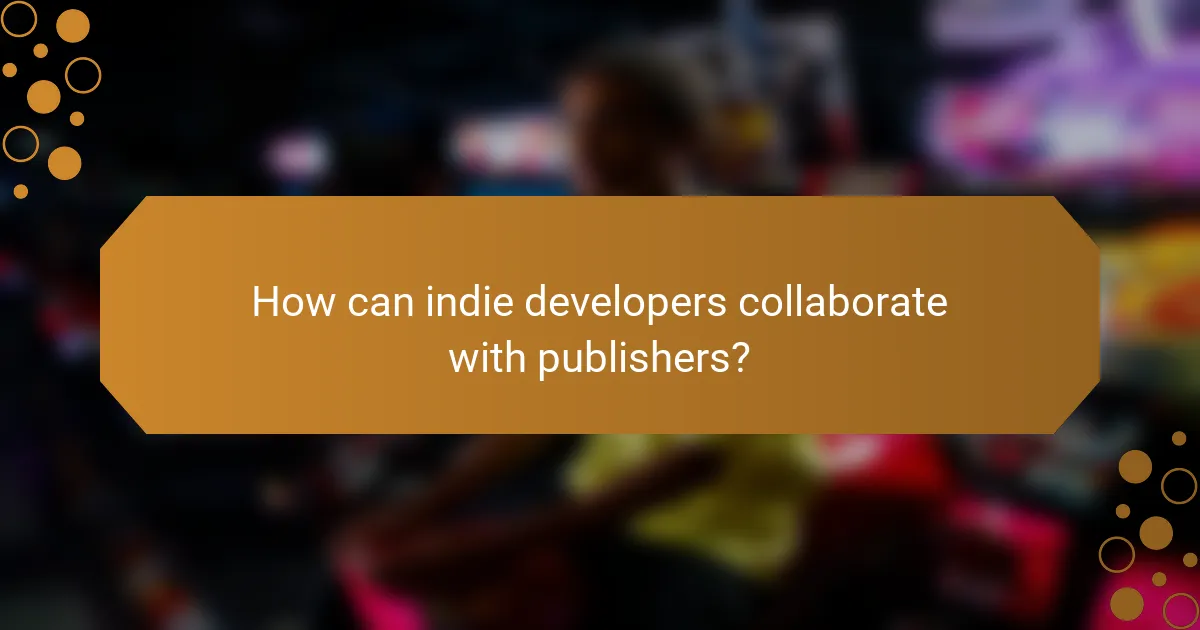
How can indie developers collaborate with publishers?
Indie developers can collaborate with publishers to enhance their game projects through shared resources and expertise. This partnership can provide crucial support in areas such as funding, marketing, and quality assurance, ultimately increasing the chances of a game’s success in a competitive market.
Funding and financial support
Collaborating with publishers often means gaining access to funding that can cover development costs, marketing expenses, and even post-launch support. Publishers typically invest in projects they believe in, which can range from tens of thousands to millions of dollars, depending on the game’s scope and potential.
When seeking a publisher, developers should prepare a solid pitch that outlines their game’s vision, target audience, and financial projections. This preparation can significantly increase the likelihood of securing the necessary funding.
Marketing and promotional resources
Publishers usually have established marketing strategies and resources that indie developers can leverage. This includes access to promotional channels, social media campaigns, and press contacts that can amplify a game’s visibility.
Indie developers should actively engage with their publishers to create a tailored marketing plan that aligns with their game’s unique selling points. Utilizing the publisher’s expertise can lead to more effective outreach and potentially higher sales.
Access to industry connections
Working with a publisher opens doors to valuable industry connections, including other developers, distributors, and influencers. These relationships can facilitate collaborations, partnerships, and opportunities that might be difficult for an indie developer to secure independently.
Developers should take advantage of these connections by networking at industry events and seeking introductions through their publishers. Building a robust professional network can lead to future projects and collaborations.
Quality assurance and testing
Publishers often provide quality assurance (QA) and testing services, which are crucial for ensuring a game’s performance and user experience. This support can help identify bugs, gameplay issues, and areas for improvement before launch.
Indie developers should collaborate closely with the QA teams to address feedback and make necessary adjustments. This iterative process can significantly enhance the final product, leading to better reviews and player satisfaction upon release.
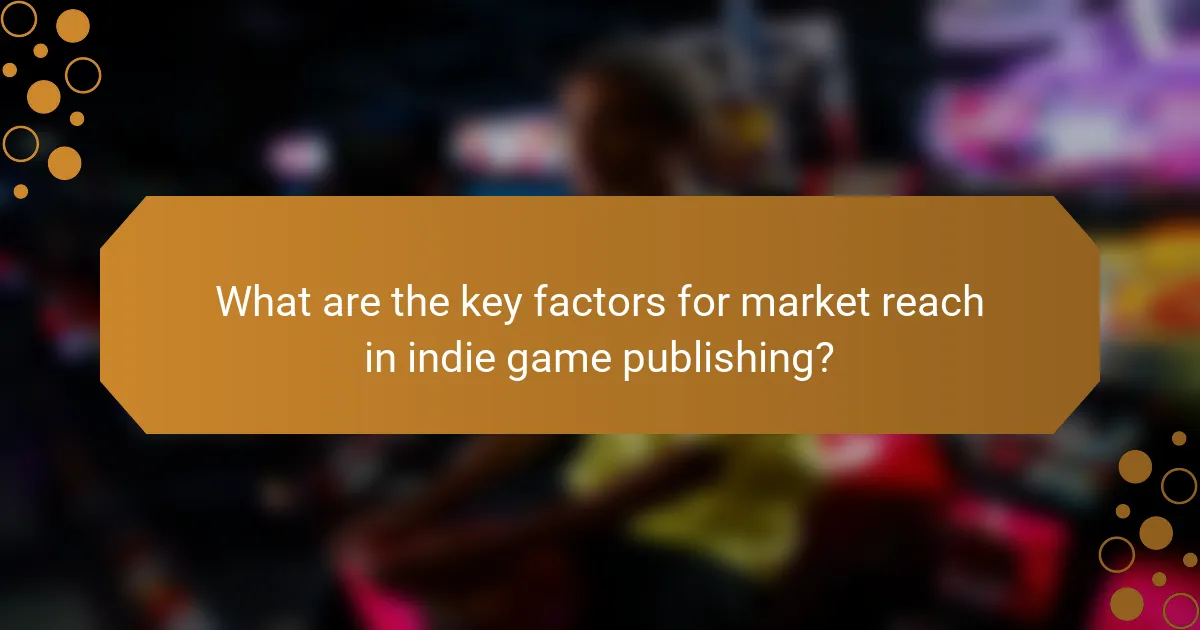
What are the key factors for market reach in indie game publishing?
Key factors for market reach in indie game publishing include understanding your target audience, implementing effective marketing strategies, leveraging social media, and participating in gaming conventions. Each of these elements plays a crucial role in connecting with players and maximizing visibility in a competitive landscape.
Target audience identification
Identifying your target audience is essential for indie game publishing. This involves understanding who your potential players are, their preferences, and gaming habits. Conducting surveys, analyzing player demographics, and studying similar games can help pinpoint your audience.
Once identified, tailor your game’s features, marketing messages, and distribution channels to resonate with this group. For instance, if your game appeals to younger audiences, consider platforms and styles that engage them effectively.
Effective marketing strategies
Implementing effective marketing strategies is vital for increasing market reach. Start by creating a strong brand identity that reflects your game’s unique elements. Utilize email marketing, content creation, and search engine optimization (SEO) to attract potential players.
Consider running promotional campaigns or offering early access to build excitement. Collaborating with influencers or streamers can also amplify your reach, as they can introduce your game to their established audiences.
Utilizing social media platforms
Social media platforms are powerful tools for indie game publishers to engage with their audience. Create accounts on popular platforms like Twitter, Instagram, and TikTok to share updates, behind-the-scenes content, and interact with fans. Regularly posting engaging content can help build a community around your game.
Utilize targeted ads on these platforms to reach specific demographics. For example, Facebook Ads can be tailored to reach users based on their interests, ensuring your game is seen by those most likely to enjoy it.
Participating in gaming conventions
Participating in gaming conventions can significantly enhance your market reach. Events like PAX, GDC, or IndieCade provide opportunities to showcase your game, network with industry professionals, and gather feedback from players. These interactions can lead to valuable partnerships and increased visibility.
Consider preparing a demo version of your game to attract attendees. Engaging presentations, giveaways, and interactive experiences can leave a lasting impression and encourage word-of-mouth promotion long after the event ends.
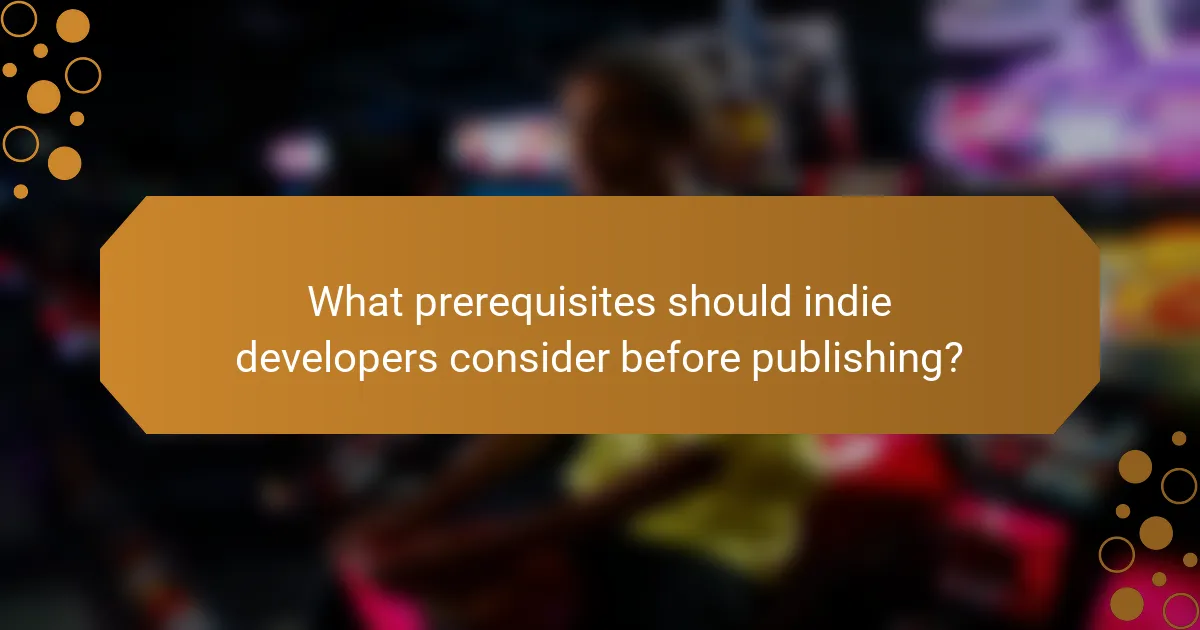
What prerequisites should indie developers consider before publishing?
Indie developers should assess their readiness in terms of game development, market understanding, and distribution strategies before publishing. These factors significantly influence the success of their game in a competitive landscape.
Game development readiness
Before publishing, developers must ensure their game is polished and ready for public consumption. This includes thorough testing to identify and fix bugs, optimizing performance, and ensuring a smooth user experience. A well-developed game can lead to positive reviews and increased sales.
Additionally, consider the platforms for release. Each platform, whether PC, console, or mobile, has specific requirements and guidelines that must be followed. Familiarizing yourself with these can prevent delays and complications during the publishing process.
Market research and analysis
Conducting market research is crucial for understanding your target audience and identifying trends within the gaming industry. Analyze competitors to see what works and what doesn’t, focusing on their marketing strategies, pricing, and user feedback. This insight can help you position your game effectively.
Utilize tools like surveys or social media polls to gather direct feedback from potential players. Understanding their preferences can guide your marketing efforts and game features, increasing the likelihood of success. Aim to identify your unique selling points that differentiate your game from others in the market.
